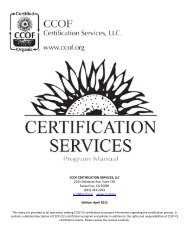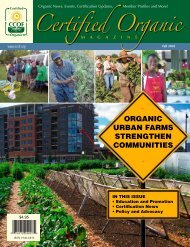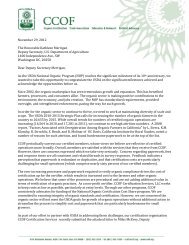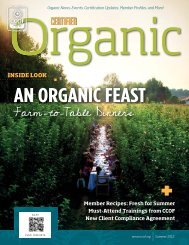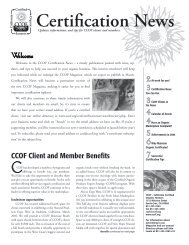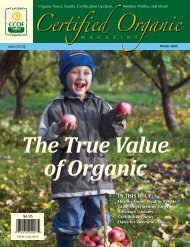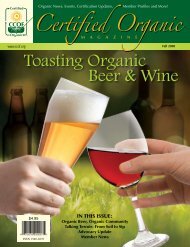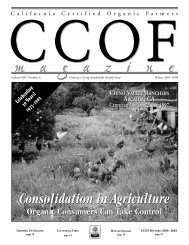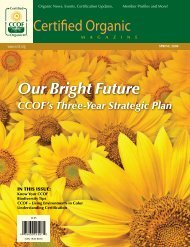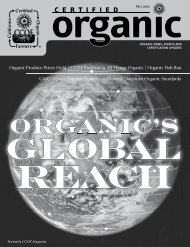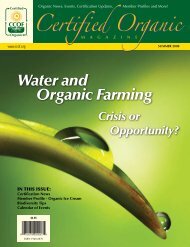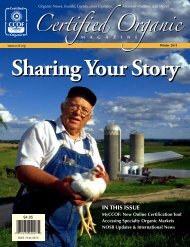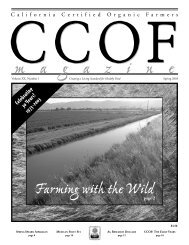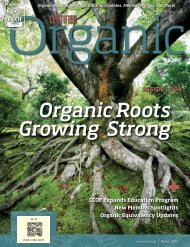Organic Gives Back - CCOF
Organic Gives Back - CCOF
Organic Gives Back - CCOF
- No tags were found...
You also want an ePaper? Increase the reach of your titles
YUMPU automatically turns print PDFs into web optimized ePapers that Google loves.
Advocacyg. Livestock – <strong>Organic</strong> regulationsdo not allow confined feedingoperations, considered tobe one of the primary sourcesof E. coli 0157. Nor do theyallow routine use of antibioticsthat can lead to E. coli strainsthat are antibiotic resistant.In addition to Congresswoman’sWoolsey’s support for our position,both Congressman Sam Farr(D-Salinas) and Congressman DennisCardoza (D-Modesto) did valiant workinforming their colleagues about theimportant role farming has in America’seconomy as well as how food safetylegislation needs to focus resourcesand efforts where they will be mosteffective and where they will notdisproportionally impact small farmers.When the US Senate returned toWashington, DC in late August, theyconsidered adding many “friendly”amendments to their Senate legislation.<strong>CCOF</strong> is grateful to the manymembers of Congress who continueto work with their constituents and itis our hope that these amendmentswill prove palatable to our members.<strong>CCOF</strong> also works with the <strong>Organic</strong>Trade Association and with the NationalSustainable Agriculture Coalition,both of whom have a presence inWashington, DC and continue to dogreat work on behalf of organic andsustainable farmers. For more informationand updates on food safety regulationsvisit www.ccof.org/foodsafety.php.Along with the work being done inthe regulatory arena, many large scalespecialty crop organizations such asWestern Growers Association, ArizonaFarm Bureau, California Farm Bureau,California Leafy Greens MarketingAgreement and others, submitted adraft marketing agreement to USDAAgricultural Marketing Service (AMS)requesting the establishment of aNational Leafy Greens MarketingAgreement. <strong>CCOF</strong> recently participatedin a webinar on this process andwill continue our efforts to monitor theprogress of this process. Accordingto the webinar, it will take between18 and 24 months for USDA toreview the draft, schedule and holdpublic meetings (which <strong>CCOF</strong> willattend), release the draft regulationscreating the agreement, respond tofurther public comment on the draftand finalize the regulations. Moreinformation on the draft agreementcan be found at www.nlgma.com.California State <strong>Organic</strong>Program (SOP) Update<strong>CCOF</strong> continues to monitor theCalifornia State <strong>Organic</strong> Program’s(SOP) efforts to respond to complaintsmade by registrants, certifiers and theNational <strong>Organic</strong> Program (NOP).Currently, <strong>CCOF</strong> sits on the SOPTechnical Planning Committee, whichreviews all programs and processes ofthe SOP as well as provides recommendationsto the California <strong>Organic</strong>Products Advisory Committee (COPAC).COPAC’s role is to advise the Secretaryof California’s Department of Food andAgriculture (CDFA) on his responsibilitiesunder the California <strong>Organic</strong>Products Act of 2003 as well as underCalifornia’s Health and Safety Code.Though SOP reform is a slow andlengthy process, <strong>CCOF</strong> is pleasedwith the progress that the TechnicalPlanning Committee and the SOPare making thus far in regards tochanging their policies, streamliningthe registration procedures, andredefining and implementing aneffective spot inspection program.SOP promulgated draft regulationsas part of their reform effort this pastspring. The regulations would havegiven certified organic operations theability to use their organic systemplan (OSP) as a reference documentfor registration purposes, thuseliminating the need to duplicateinformation contained in the OSP onSOP registration forms. Registrantsmaking $5000 or less would still berequired to submit the informationrequested. Unfortunately, because theinformation required on the registrationforms is required in statute, CDFA’slegal counsel rejected the proposedregulations and notified SOP thatthey must use the legislative processto streamline the registration process.<strong>CCOF</strong> remains ready to help in any waywe can to make sure this happens.SOP also recently worked with<strong>CCOF</strong> staff and other members ofthe Technical Planning Committee toreview the spot inspection program anddevelop regulations that give the SOPauthority to do a much better job in thisarea. The newly designed spot inspectionwill focus primarily, althoughnot exclusively, on registrants making$5000 and less,* with the recognitionthat certified organic operations arealready inspected at least once a yearby their certifier. SOP acknowledgesthat they are not certifiers and thereforedo not need to duplicate thoseactivities but instead fill the gaps.<strong>CCOF</strong> continues to monitorSOP and participate actively in theCalifornia <strong>Organic</strong> Products AdvisoryCommittee (COPAC) meetings, to stayinformed and to watchdog the actionsof the Department.For additional information on SOPand COPAC visit:www.cdfa.ca.gov.* The NOP regulations have anexemption clause that states thatoperations making $5000 or less arenot obliged/required to undergo thecertification process. While many stilldo, others do not and are thereforenot subject to inspection by certificationagencies. So, it is particularlyappropriate and beneficial to consumersand the industry for CDFA to befocusing their efforts in this area.<strong>CCOF</strong> Certified <strong>Organic</strong> Magazine—Fall 200927



